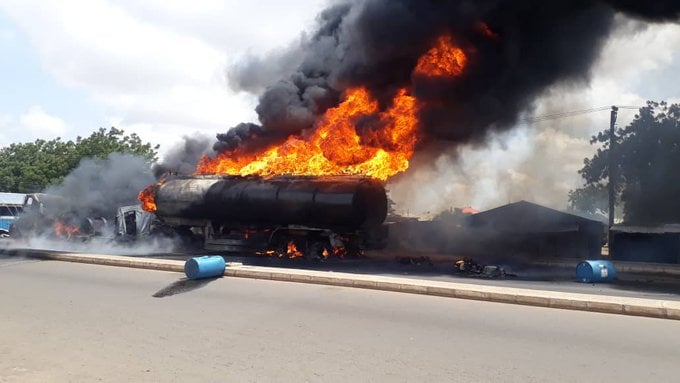A fuel tanker fire on the Lagos-Ibadan Expressway in Ogun State sent panic through the community but, thankfully, caused no fatalities. The Traffic Compliance and Enforcement Corps (TRACE) confirmed that only minor injuries were recorded, alongside damage to property. Quick intervention by first responders helped reduce what could have been a national tragedy.
How the Tanker Fire Started
According to eyewitness reports, the accident began when a loaded fuel tanker lost control and overturned. The impact caused fuel to spill across the road, and a fire quickly erupted. Motorists scrambled for safety as thick smoke filled the area. Nearby shops and vehicles sustained damage before emergency teams arrived.
TRACE and Emergency Teams Step In
TRACE officials worked alongside the Federal Road Safety Corps (FRSC), police, and fire service personnel to contain the fire. Their swift action prevented the flames from spreading further. The injured victims received immediate treatment, and authorities ensured that traffic was redirected to ease congestion.
Road Safety Concerns in Ogun State
Incidents like this highlight ongoing concerns about road safety in Nigeria. Tanker accidents remain common, especially on major highways such as the Lagos-Ibadan Expressway. Poor road conditions, reckless driving, and inadequate tanker maintenance all contribute to the danger. TRACE officials urged drivers to remain cautious and advised tanker owners to maintain their vehicles properly.
Community Impact and Reactions
Residents expressed relief that the accident did not claim lives, but they also voiced frustration at the recurring tanker-related incidents in Ogun State. Business owners counted their losses as fire consumed shops and vehicles parked near the expressway. Community leaders called for stricter regulations on fuel transportation to prevent future disasters.
Government’s Next Steps
The Ogun State government announced plans to collaborate more closely with road safety agencies to reduce accidents. Proposals include stricter checks on fuel tankers, better road monitoring, and increased penalties for reckless drivers. These steps, if enforced, could save lives and protect communities living near major highways.
Why This Story Matters
This incident serves as a reminder of how fragile road safety remains in Nigeria. Although TRACE confirmed that only minor injuries occurred, the potential for massive loss of life was very real. Ensuring accountability in tanker operations, enforcing safety standards, and investing in road infrastructure are essential to prevent future tragedies.
Conclusion
The Ogun tanker fire could have ended far worse, but TRACE confirmed that the damage was limited to minor injuries and property loss. Quick response from emergency services saved lives, but the incident highlights the urgent need for improved road safety measures in Nigeria. The government, transport companies, and drivers all share responsibility for ensuring safer highways.
Bonus Read: Rescuers Rush Oxygen to Survivors After Indonesia School Collapse



